I Read Fiction Too (I Swear)
I like science, as you can probably tell from the other book sections, or by looking at the majority of my website. But I do read other things besides non-fiction, I swear! And even better, I've actually enjoyed reading some of them! So here, for your viewing pleasure, are some of my favorite fiction books and authors. They are divided into a section of specific books, and then authors I like.
You will find that some of these books are collections of short stories. I have found that I enjoy short stories because they are usually faster paced, and provide many more plots and characters than one long story. Of course, I may also have a short attention span (which explains why I like reading comic books).
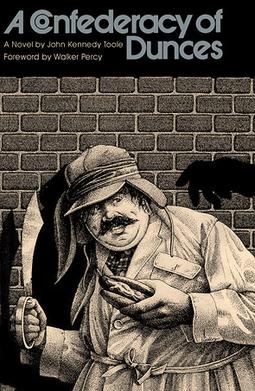
A Confederacy of Dunces, by John Kennedy Toole
I've heard about this book for years, but finally had a chance to read it. It's freakin' hilarious. I don't know how he wrote it, but it's absolute genius. Follow Ignatius J. Reilly through his interactions with other colorful characters in New Orleans. He's insanely self-absorbed, insulting, narcissistic, and most important, insane. The book was ahead of it's time, and perfectly captures the voice and attitude of the anonymous internet masses who are belligerent, misogynistic, racist, and all-around offensive. It's genius, hilarious, and I highly recommend it.

Contact, by Carl Sagan
I actually watched the movie first, and I enjoyed the book immensely. I think there is a scientific angle that is lost on the big screen. The book shares a similar plot but with more accent on character development and scientific aspects (obviously). The book follows a radio astronomer as she receives and interprets an alien signal, and explores the implications within. One of the best stories involving benevolent extraterrestrials since Close Encounters of the Third Kind.

I, Robot Series, by Isaac Asimov
Thought I'd give these a read so I picked up the whole series. The first book is more a compilation of short stories all with robotic predicaments and paradoxes. The second through fourth books are single stories with the same characters in each. To be honest, although I enjoyed the first book, the others were a bit slow with a lot of back and forth between the characters. It's the classic buddy cop "I hate my partner now we're friends" sort of thing.

Dune, by Frank Herbert
It's a hefty book but worth the read. Get immersed in the detailed world of Arrakis. More than just an average sci-fi book, there's a lot of political, social, and ecological commentary. I found the environmental analogies most interesting, with regards to preservation of nature and the interactions between humans and other creatures. I haven't read the sequels, but I'm looking forward to the movie!

The Three-Body Problem, Cixin Liu
A page-turner for sure! Loved the way this book unfolded, as the mystery became more mysterious and built suspense until it was all explained. Tons of physics, mysterious planets, and secret conspiracies. Can't wait to read the rest of the series, and watch the Netflix show!

Anonymous Rex + Casual Rex, by Eric Garcia
Imagine if someone was on drugs, and those drugs were on drugs. Even then, they couldn't come up with a story as ridiculous as this premise. The concept is that dinosaurs never went extinct, and are in fact living within society wearing human disguises. Also, they get high on everyday normal herbs. Yep, basil, parsley, etc. These books are hilarious and impossible to explain to other humans.

Martian Chronicles, by Ray Bradbury
I'd heard great things about this book, but I figured it wouldn't live up to "The Illustrated Man." I was completely wrong. From the first chapter I was absolutely hooked. In truth, it's very much a chronicle, with the overarching theme being about Mars but the stories only loosely related. The stories are subtly witty with plenty of societal commentary thrown in. It's the sort of book you can read a second time and enjoy just as much as the first.
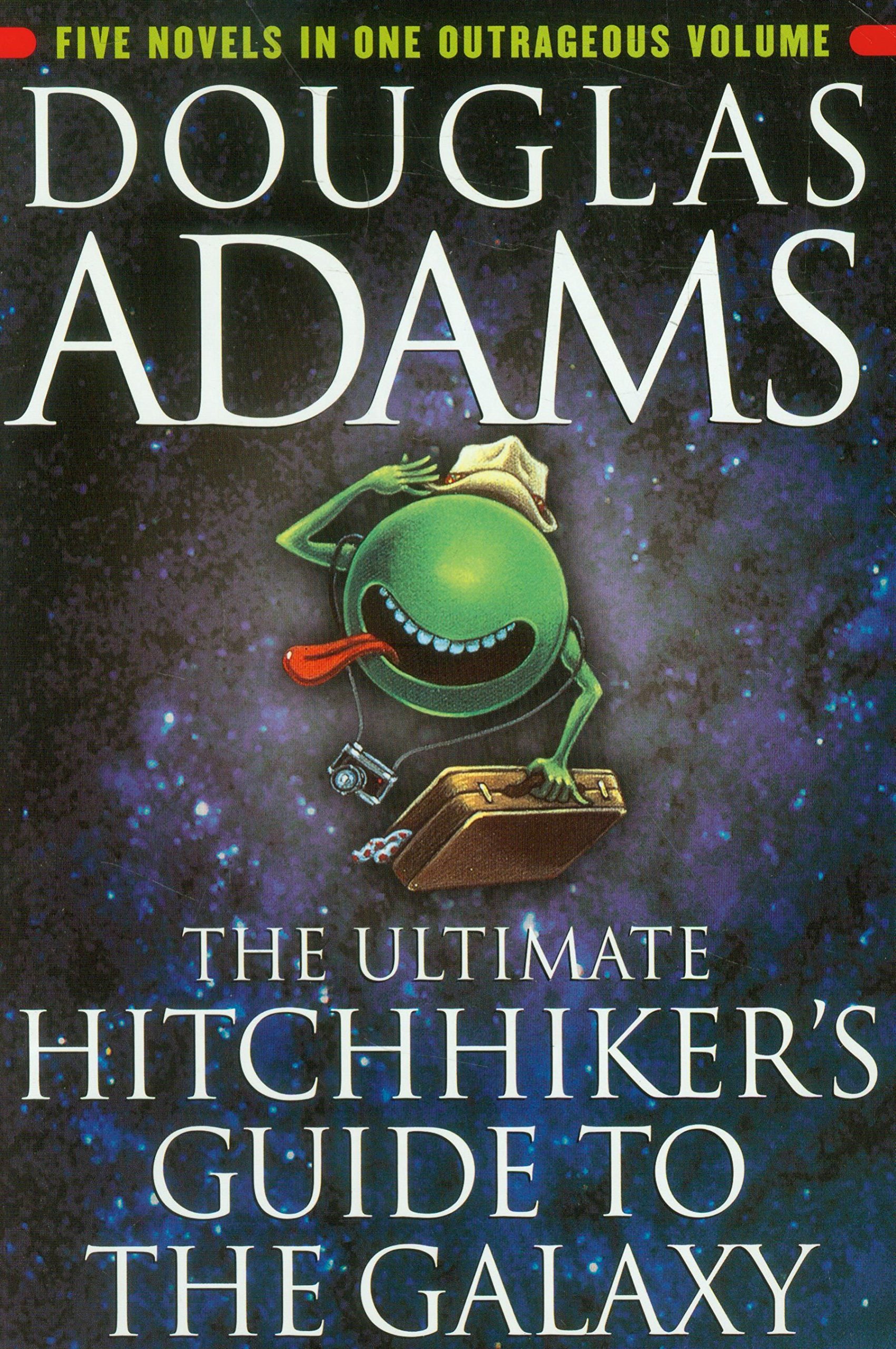
The Hitchhiker's Guide to the Galaxy, by Douglas Adams
Not going to lie, this book is weird. I tried reading this back in high school, thought it was too weird, and put it away until medical school. It's weird, but it's good. It starts off with an ordinary human, saved at the last millisecond from the destruction of Earth by an alien who has been writing an entry on Earth for "The Hitchhiker's Guide to the Galaxy." From there, it just gets weirder. The books are funny, not laugh out loud funny, but "huh, this is a strange twist" funny. Definitely read all five books, you can buy them as one big volume.

The Right Stuff, by Tom Wolfe
I really enjoyed his writing in "Bonfire of the Vanities" so I decided to give this a read. The book describes the development of the space program, how those that joined and made it through the ranks had the "right stuff." The book focuses on the Mercury Seven, the first astronauts to go into space. They are constrasted with the previous generation of heroes, those who pushed the boundaries of flight (like Chuck Yeager breaking the sound barrier). He writes about not only the astronauts and their lives, but also their wives who supported them throughout their endeavors. A movie was produced but I haven't seen it yet (it's 3 hours long...)

Sherlock Holmes, by Sir Arthur Conan Doyle
Everyone knows about Sherlock Holmes, but how many people have actually read him? I finally read the complete works after seeing the first Sherlock Holmes movie in 2009. I was instantly drawn in to the stories, amazed by the unparalleled intellect of Holmes. Each time you start a new story, you don't expect it to be as thrilling as the one you just finished, but of course you're pleasantly surprised each time. I cannot forget Watson, who provides a human anchor for Holmes, without which he would drift away in an intellectual stupor, and most likely forget to eat. If you enjoyed the movies or the TV shows, you will definitely enjoy these stories.
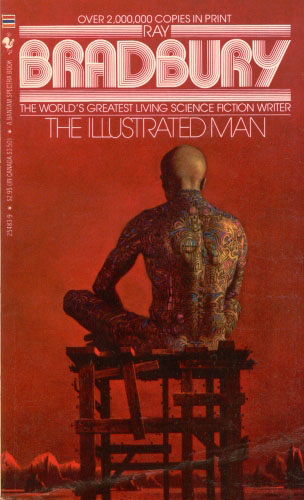
The Illustrated Man, by Ray Bradbury
This is my favorite Bradbury story out of all the ones I have read. It is a collection of short stories, told in the context that each story is represented on a man with many tattoos, the "illustrated man." For some reason, I have found these stories to be more enjoyable than his other collections. These stories involve foreign worlds, new realities, and strange concepts. I first read this book in middle school, but many of these stories have stuck with me since then. This book is sure to make you stop and think, and maybe even give you some chills.

I Am Legend, by Richard Matheson
This novel was the inspiration for the Will Smith movie of the same name. The idea is that a virus has spread, infecting individuals and causing them to act in a fashion similar to the vampires of legends. The main character finds himself as a lone survivor, being somehow immune to the virus. The story follows him as he deals with his existence as the only true human left on Earth, and how to keep on living. This is not a typical vampire story, but is instead the story of a man, stuck between true loneliness and his existence in a hostile world full of people that are not quite human. The story is relatively short, and you can find copies of the book that include other Richard Matheson stories that are equally enjoyable.

The Good Earth, by Pearl S. Buck
This is probably the most enjoyable book I've ever been forced to read by an English teacher. It is purely realistic fiction, set in rural China during the early 1900s. The main character is a poor farmer who has practically nothing. He slowly gains a fortune due to lucky circumstances, and takes advantage of his newfound wealth while dealing with some of the issues of the rich. I really enjoyed reading this book, as you watch the personality of the protagonist change over time, morphing into a member of the upper class that he once despised. The message of this book is still extremely applicable in today's society, as we look at the disparity between the 99% and the 1%. The book makes you think about your circumstances, and makes you wonder how your outlook on life would change if your situation was different.
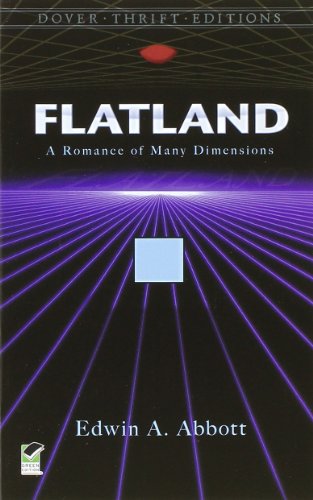
Flatland, by Edwin A. Abbott
Who knew geometry could be such a deep concept? This book is narrated by a square, aptly named "A. Square." He begins by describing his life in Flatland, a two-dimensional world where all of the inhabitants are different shapes, placed into different classes based on their number of sides. Eventually, he is visited by a traveller from the 3-D world, a sphere, who opens his eyes to the dimensions beyond his own. Although told in terms of geometry, this story is a commentary on social classes, religion, and the possibility of worlds and dimensions beyond our own. Whether you read it for its mathematical aspects of the underlying messages, you are sure to enjoy your trip to the world of Flatland!

Laughing Space, by Isaac Asimov
This book, compiled by the great Isaac Asimov, is actually an anthology of light-hearted science fiction stories that you are sure to enjoy. I have read this volume at least twice, and many of the stories have stuck with me throughout the years. One involves an Amazonian river which reverses the left/right of anything that passes down it...so of course it's used to produce cheaper shoes! There's a story about finding a cure for the common cold, and the unforseen consequences that entails. There is even a story about a women's club that tries to take over the world! THere are loads of great stories in this volume, and you're sure to enjoy at least one, I promise.

Cloud Atlas, by David Mitchell
It's hard to describe this book's effect on your brain, I mainly just finished the book and had a hard time processing how well it was written and put together. The book consists of six intertwined stories, each one pausing halfway on a cliffhanger to move to the next one in chronological order, then moving backwards in the second half of the book to finish and truly connect each story to the other. I had a hard time putting this book down.
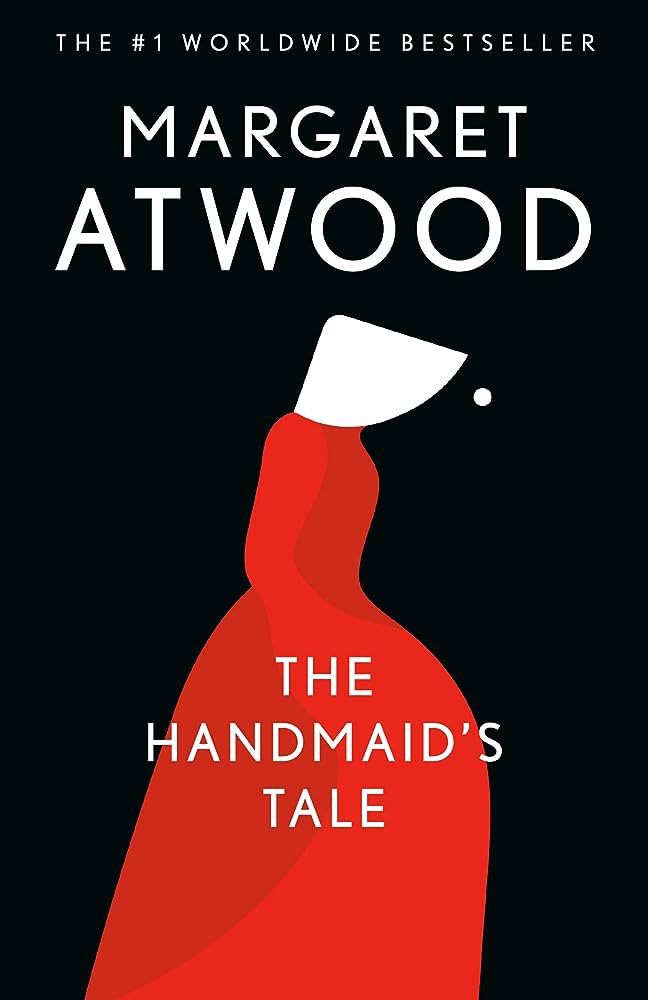
The Handmaid's Tale, by Margaret Atwood
Most people have heard of this book already, but if you haven't read it you really should. The book is about a misogynistic dystopian society that uses women for childbirth and treats them as property. Like all good science fiction, it is not based on a possible future but the aspects of society that already exist, the frequent attempts to control women's bodies.
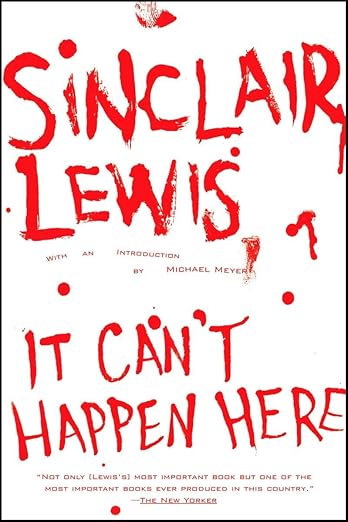
It Can't Happen Here, Sinclair Lewis
Although this book was written in 1935, it feels as if it was written in 2026. Lewis writes a piece of fiction, that although the dialogue and plot is lacking in some ways, is an all-too-believable look at how the US could devolve into fascism, and even mirrors the horrors of Nazi Germany, despite being written years prior. Less well-known than the Handmaid's Tale, I would argue this book is just as important a read. Sometimes the scariest fiction are the ones that could easily happen.

Philip K. Dick
If you're a member of Cornell's class of 2014, you'll remember him as the author of our required reading, "Do Androids Dream of Electric Sheep?" Whether or not you enjoyed this book, Dick is an extremely prolific science fiction author, and has had a few of his stories turned into movies (Total Recall, Minority Report). He uses his writings for social and technological commentary, and also has many humorous stories as well. You can easily find volumes containing a bunch of his short stories, and they are sure to keep you entertained for hours.
Do Androids Dream of Electric Sheep?-The basis for Blade Runner, this story questions what it is to be human, and is a robot human if you can't tell that it's a robot?
Minority Report-This story is the basis for the movie of the same name. What if the police could predict who is going to commit a crime, and arrest them before they commit it? This story leads to many moral and philosophical issues, but I cannot vouch for the movie as well.
We Can Remember It for You Wholesale-This book is the basis for the movie Total Recall. It involves the concept of implanted memories, questioning what is truly reality, and what is just false memories? The 1990 movie features the great AHNOLD.
Michael Crichton
I read a ton of Michael Crichton's books in middle and high school, and I enjoyed them A LOT. The great thing about Crichton as a writer is that he makes his books believable. Take Jurassic Park, for example. The concept of dinosaurs terrorizing humans is completely in the realm of science fiction, but the method that the dinosaurs come about is "scientifically plausible," which makes the story much more enjoyable to read, as opposed to if the dinosaurs came about by magic. Oftentimes, stories use "deus ex machina," or "god in the machine," meaning that the author finds a way to save the day through a convoluted method. Instead, Crichton writes his stories so that they flow, preventing complaints of plot holes or shortcuts in the stories.
Jurassic Park-His most famous story, it revolves around the cloning of dinosaurs based on preserved DNA, and the horrific consequences of those actions.
The Andromeda Strain-In this story, an alien disease makes its way to Earth, and the protagonists try to study and contain the disease.
The Terminal Man-This book presents the idea of implanting brain electrodes to modify individuals behavior. However, the test subject finds a way to use the electrical stimulation for his own sinister needs.Timeline-Pretty much a time travel story, but with interesting consequences in the past and present.

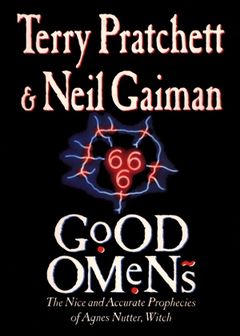
Good Omens and American Gods, by Neil Gaiman (and Terry Prachett)
These books are actually very different, but each wonderful in its own right. "American Gods" puts a modern twist on mythologic figures in a war between the old and new gods. It examines what it means to believe, what to believe in, and why. On the flip side, "Good Omens" is a perfect example of the subtlety of British humor, comparable to "The Hitchhiker's Guide..." The book follows the coming armageddon and a war between heaven and hell, full of dry wit. It was an excellent refreshing read.
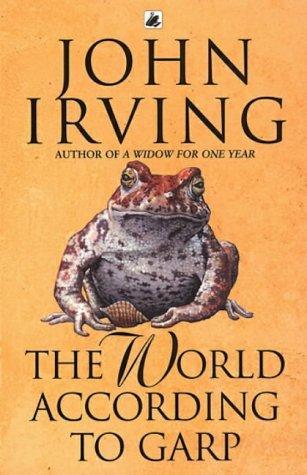
John Irving
John Irving may write realistic fiction, but I'm not sure who's reality it's based on. Each of his books follows a seemingly normal protagonist, but there are many subtle and not-so-subtle quirks to each character. I don't want to spoil too much, but the characters are often so ridiculous you can't help but laugh at their predicaments. Irving's books have their emotional moments too, and you can empathize with the portrayal of their predicaments. You will occasionally find yourself asking, "did that actually just happen?"
The Hotel New Hampshire-This story follows a family through the trials and tribulations of the father's dream to run "The Hotel New Hampshire" in its different incarnations.
The World According to Garp-I don't know how to describe this book, so you'll just have to read it. It's great.
The Cider House Rules-A book about a young boy that grows up at a rural abortion clinic. It starts out weird and just gets weirder.

Stephen King
I'll preface this by saying that I do NOT like horror movies and I'm easily scared/spooked/startled. However, I quite enjoy reading Stephen King. King is a prolific writer, and has numerous books of all shapes and sizes (often huge). I am partial to his short story collections, of which there are at least 5. If you like horror, King is definitely worth reading. If you don't like horror, you may still want to check out a book, because he's an amazing writer.
Night Shift, Skeleton Crew, Nightmares & Dreamscapes, Just After Sunset, Everything's Eventual-These are his short story collections, which I really enjoyed. It gives you a great variety of stories, so you're sure to find something that interests you. Some of them have even been adapted into movies.
Carrie-This is his earliest book, and instantly made him famous. It tells the story of a girl with pyrokinetic powers, who lives with her ultra-religious mother. The book is super interesting, because it's told in part using newspaper clippings and recordings from judicial hearings to tell the story.
It-This is a super-long, super-creepy story about an evil that haunts a town and the 5 children who destroyed it once, and must destroy it again upon its return.
Cell-A strange signal sent to all cell phones causes the majority of the population to become psycopathic killers, while the few survivors try to find a way to defeat them.
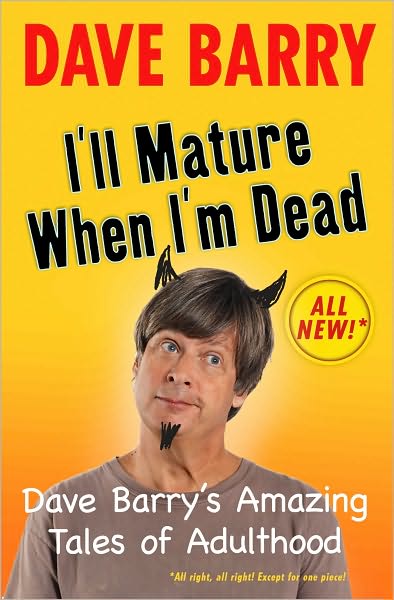
Dave Barry
If you're looking for hilarity, look no further! Dave Barry is a great man with even greater writings. He used to be a syndicated columnist from Miami, and many of his books are collections of his columns. I much prefer his other books, in which he writes about a variety of topics, such as mankind's history or how to properly make a baby. Barry's writing is always funny, and it's often scary how true some of his remarks are, with regards to politics, the economy, or society in general.